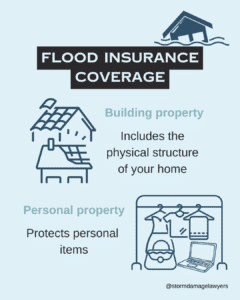Floods can be devastating, leaving homeowners facing extensive damage and costly repairs.
For many Texans, the aftermath of a flood means realizing that they don’t have flood insurance or grappling with denied, underpaid, or delayed insurance claims. That’s where a Texas flood damage lawyer comes in to help. Navigating this complex process can be overwhelming and stressful, making it vital to have a solid understanding of your insurance coverage and rights.
In Texas, where severe weather events are common, understanding the importance of flood insurance is necessary. As Texas flood damage lawyers, we see firsthand the challenges homeowners face when dealing with insurance claims. We will explain why flood insurance is important and how it can protect your property and financial well-being.
Here’s what we’ll cover:
- Understanding Flood Insurance: What is it and why every Texas property owner should consider it.
- Flood Insurance Cost
- Common Mistakes to Avoid when Filing a Claim
- How to Prepare for Future Floods
- Legal Assistance: How a Texas flood damage lawyer can help.
Understanding Flood Insurance with a Texas Flood Damage Lawyer
Flood insurance is a specialized policy. It is separate from standard homeowners’ insurance. Floods can cause extensive damage that is not covered by regular policies which is why it’s important to understand how it works.
Flood insurance typically covers two types of properties: building property and personal property. Building property coverage includes the physical structure of your home. This includes electrical and plumbing systems, appliances, and carpeting. Personal property coverage protects your belongings. This includes clothing, furniture, electronics, and other personal items.
Floods are unpredictable and can cause extensive damage. In Texas, flood insurance is a smart investment since many standard policies don’t cover flood damage. This leaves you vulnerable when the aftermath of a flood can be financially devastating.
Texas experiences frequent severe weather events. Hurricanes, tropical storms, and heavy rainfall in cities along the Texas coast can all lead to flooding. Even areas not traditionally prone to flooding can be affected.
Flood insurance provides a financial safety net. Without flood insurance, you may face enormous out-of-pocket expenses. This can include repairing structural damage, replacing furniture, and addressing mold issues. Flood insurance ensures you are not left with crippling financial burdens after a flood.
Stormlex tip: If your property is in an area that has a history of flooding, consider contacting your insurance agent to add flood insurance to your plan. The best case scenario is that you won’t have to use your flood insurance, but the worst case scenario would be wanting to use it and not having it in place to help you.
Who Needs Flood Insurance?
Every homeowner should consider flood insurance. Floods are the most common natural disaster in the United States. They can occur anywhere, not just in high-risk flood zones.
If you live in a high-risk area, your mortgage lender will likely require flood insurance. However, even in moderate-to-low risk areas, flood insurance is advisable. More than 20% of flood claims come from properties outside high-risk areas.
Texas Flood Damage Lawyer Explains the Cost of Flood Insurance
The cost of flood insurance varies. It depends on several factors, including your location, the age and construction of your home, and the level of coverage you choose.
Homes in high-risk areas will have higher premiums. However, the cost of not having flood insurance can be much higher. Without coverage, you are responsible for all repair and replacement costs after a flood.
Besides the regular insurance companies, in case of flood risk you can also check if your area qualifies for the National Flood Insurance Program (NFIP), a federal program. It provides flood insurance to property owners, renters, and businesses. Managed by the Federal Emergency Management Agency (FEMA), it aims to reduce the impact of flooding.
NFIP policies are available to homeowners, renters, and businesses in participating communities. These communities agree to adopt and enforce floodplain management regulations to reduce future flood damage.
Be sure to visit the NFIP website for more information.
Common Mistakes to Avoid Explained by a Texas Flood Damage Lawyer
Many claims are denied due to technicalities. Common reasons for claim denials include insufficient documentation, missed deadlines, and policy exclusions. There are several common mistakes homeowners make when filing a flood insurance claim. Avoiding these can help ensure a smoother process and better outcome.
- Not Having Enough Coverage: Ensure your policy covers both building and personal property.
- Delaying the Claim: Report the damage as soon as possible. Delays can result in complications and lower payouts.
- Inadequate Documentation: Thoroughly document all damage. Lack of documentation is a common reason for claim denials.
- Accepting Low Offers: Don’t feel pressured to accept the first offer from your insurer. Consult with a property damage lawyer to understand your options.
Tips from a Texas Flood Damage Lawyer On Preparing for Future Floods
Floods are inevitable, but there are steps you can take to minimize damage and protect your property.
- Raise Appliances and Utilities: Place appliances and utilities like water heaters, furnaces, and electrical panels above potential flood levels.
- Install Flood Vents: Flood vents allow water to flow through your home, reducing structural damage.
- Seal Your Basement: Use waterproofing compounds to seal walls and floors.
- Create an Emergency Plan: Have a plan in place for evacuation and communication. Ensure all family members know what to do in case of a flood.
- Maintain Your Property: Keep gutters and drains clear of debris. Ensure the grading around your home directs water away from the foundation.
Challenges Faced by Texas Homeowners
Filing a flood damage claim is often complicated. Insurers may delay or underpay claims. Insurance companies can be unresponsive. They may require extensive documentation. Even with proper documentation, claims can be denied. This can leave you feeling frustrated and helpless.
Homeowners may face lengthy delays in claim processing. This can stall repairs and prolong recovery. It is important to have an advocate who understands the intricacies of insurance claims. A home damage insurance claim lawyer can help you expedite the process.
Benefits of Legal Assistance from a Texas Flood Damage Lawyer
A lawyer can ensure your claim is handled properly. At Stormlex Law Group we advocate for fair compensation. We also negotiate with insurers since we understand the tactics insurance companies use to minimize payouts.
Insurance companies may argue that the damage was pre-existing. They might claim that the policy does not cover certain types of damage. Policyholders often feel pressured to accept low settlement offers. Insurers may take advantage of homeowners’ lack of knowledge. We are here to ensure you understand your rights and options.
Our legal professionals have experience dealing with insurance adjusters. We know how to counter lowball offers and push for a fair settlement. Our expertise can significantly increase the amount of compensation you receive.
A property damage lawyer provides peace of mind. We handle the complexities of the claim, allowing you to focus on recovery. Having us on your side can deter insurance companies from acting in bad faith. They are less likely to delay or underpay your claim when they know you have legal representation. This can lead to quicker and fairer settlements.
Flood insurance is necessary for Texas property owners. It protects against unpredictable weather events. With the right legal help, you can secure your home and financial future. Don’t wait for a disaster to strike before taking action.
STORMLEX LAW GROUP
Stormlex Law Group is sharing weekly videos that break down insurance policy terms and why they matter, tips for navigating the claims process more effectively, and all things Texas insurance law related.
If you reside in San Antonio, Dallas, Austin or another Texas city, be sure to give us a follow so that you know your property rights as a policyholder in Texas!
Photo by The Tampa Bay Estuary Program on Unsplash




















